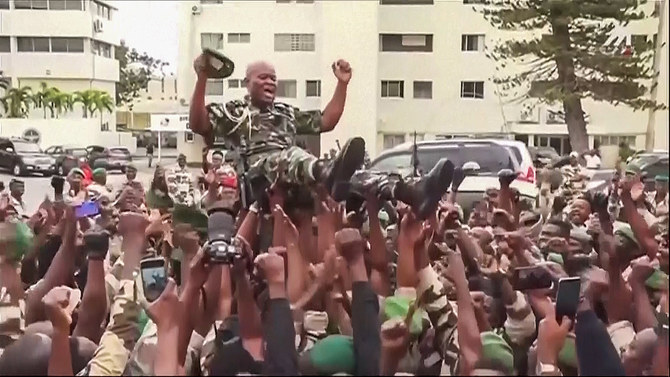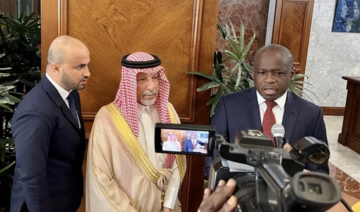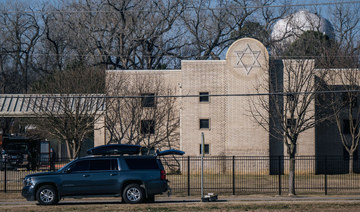LIBREVILLE, Gabon: Mutinous soldiers in Gabon announced late Wednesday that the head of the country’s elite republican guard would lead the Central African country, hours after saying they had placed the country’s newly re-elected president under house arrest.
The coup leaders said in an announcement on Gabon’s state TV that Gen. Brice Clotaire Oligui Nguema had been “unanimously” designated president of a transitional committee to lead the country.
Oligui is the cousin of President Ali Bongo Ondimba, who earlier Wednesday had been declared the winner of the country’s presidential election in a victory that appeared to extend his family’s 55-year rule in the oil-rich nation.
In a video apparently from detention in his residence, Bongo called on people to “make noise” to support him. But the crowds who took to the streets of the capital instead celebrated the coup against a dynasty accused of getting rich on the country’s resource wealth while many of its citizens struggle.
“Thank you, army. Finally, we’ve been waiting a long time for this moment,” said Yollande Okomo, standing near soldiers from Gabon’s elite republican guard, one of the units that staged the takeover.
Coup leaders said there would be a curfew from 6 p.m. to 6 a.m. local time but that people would be allowed to move about freely during the day on Thursday.
“The president of the transition insists on the need to maintain calm and serenity in our beautiful country ... At the dawn of a new era, we will guarantee the peace, stability and dignity of our beloved Gabon,” Lt. Col. Ulrich Manfoumbi said on state TV Wednesday.
Bongo, 64, has served two terms since coming to power in 2009 after the death of his father, who ruled the country for 41 years, and there has been widespread discontent with his reign. Another group of mutinous soldiers attempted a coup in 2019 but was quickly overpowered.
The former French colony is a member of OPEC, but its oil wealth is concentrated in the hands of a few — and nearly 40 percent of Gabonese aged 15 to 24 were out of work in 2020, according to the World Bank. Its oil export revenue was $6 billion in 2022, according to the US Energy Information Administration, or $2,720 per capita.
Nine members of the Bongo family, meanwhile, are under investigation in France, and some face preliminary charges of embezzlement, money laundering and other forms of corruption, according to Sherpa, a French NGO dedicated to accountability. Investigators have linked the family to more than $92 million in properties in France, including two villas in Nice, the group says.
A spokesman for the soldiers who claimed power Wednesday said that Bongo’s “unpredictable, irresponsible governance” risked leading the country into chaos. In a later statement, the coup leaders said people around the president had been arrested for “high betrayal of state institutions, massive embezzlement of public funds (and) international financial embezzlement.”
Some analysts warned that the takeover risked bringing instability and could have more to do with divisions among the ruling elite than efforts to improve the lives of ordinary Gabonese. Celebrating soldiers hoisted the head of the republican guard — who is a relative of Bongo — into the air. It’s unclear if the military intends to name him as their new leader.
The coup came about one month after mutinous soldiers in Niger seized power from the democratically elected government, and is the latest in a series of coups across West and Central Africa in recent years. The impunity those putschists enjoyed may have inspired the soldiers in Gabon, said Maja Bovcon, senior analyst at Verisk Maplecroft, a risk assessment firm.
In weekend elections, Bongo faced an opposition coalition led by Albert Ondo Ossa, an economics professor and former education minister whose surprise nomination came a week before the vote. Every election held in Gabon since the country’s return to a multiparty system in 1990 has ended in violence, and there were fears this one would as well.
The vote was criticized by international observers, but a relative calm prevailed until the early hours of Wednesday, when Bongo was declared the winner. Minutes later, gunfire was heard in the center of the capital, Libreville. Later, a dozen uniformed soldiers appeared on state television and announced that they had seized power.
Soon after, crowds poured into the streets. Shopkeeper Viviane Mbou offered the soldiers juice.
“Long live our army,” said Jordy Dikaba, a young man walking with his friends on a street lined with armored policemen.
Libreville is a stronghold of support for the opposition, but it was unclear how the coup attempt was seen in the countryside, where more people traditionally back Bongo.
The president pleaded for support in a video showing him sitting in a chair with a bookshelf behind him. He said he was detained in his residence and that his wife and son were elsewhere.
“I’m calling you to make noise, to make noise, to make noise really,” he said in English. The video was shared with The Associated Press by BTP Advisers, a communications firm that helped the president with polling for the election.
The coup leaders have said the president was under house arrest, surrounded by family and doctors.
Ossa, the opposition leader, told The AP he wasn’t ready to comment and was waiting for the situation to evolve.
“Gabon was in a midst of another electoral coup, so a coup chased another coup and the latest one has more chances of being popular, but let’s remain cautious,” said Thomas Borrel, a spokesperson for the Paris-based human rights group Survie, which advocates against France’s interventionist policies in Africa. “If a military dictatorship replaces Bongo’s dictatorship, the Gabonese population would lose again.”
The mutinous officers vowed to respect “Gabon’s commitments to the national and international community.” But the coup attempt threatened to bring the economy to a halt.
A man who answered the phone at the airport said flights were canceled Wednesday, and the private intelligence firm Ambrey said all operations at the country’s main port in Libreville had been halted, with authorities refusing to grant permission for vessels to leave. Several French companies said they were suspending operations and moving to ensure the safety of their staff.
“France condemns the military coup that is underway in Gabon and is closely monitoring developments in the country,” French government spokesperson, Olivier Veran, said Wednesday.
France has maintained close economic, diplomatic and military ties with Gabon, and has 400 soldiers stationed in the country leading a regional military training operation. The US Africa Command said it has no forces stationed in the Central African nation other than at the US Embassy.
Unlike Niger and two other West African countries run by military juntas, Gabon hasn’t been wracked by jihadi violence and had been seen as relatively stable.
White House National Security Council spokesman John Kirby said the events in Gabon were being followed with “great concern.” He said it was too early to call it part of a trend or a “domino effect” in military takeovers on the continent.
Nigeria’s President Bola Tinubu, however, cited a “contagion of autocracy we are seeing spread across our continent,” in a statement issued by his office. It said he was conferring with other heads of state and the African Union, whose commission condemned the coup and called for a return to “democratic constitutional order.”
The European Union’s top diplomat, Josep Borrell, said Gabon would be discussed by the bloc’s ministers this week, adding that another military coup, if confirmed, would increase “instability in the whole region.”
A spokesperson for China’s Foreign Ministry, Wang Wenbin, called on the parties to resolve the issue peacefully.
Soldiers in Gabon say they’ve seized power and appointed the republican guard chief as head of state
https://arab.news/bpv7p
Soldiers in Gabon say they’ve seized power and appointed the republican guard chief as head of state

- The coup leaders said in an announcement on Gabon’s state TV that Gen. Brice Clotaire Oligui Nguema had been “unanimously” designated president of a transitional committee
- In a video apparently from detention in his residence, Bongo called on people to “make noise” to support him




























